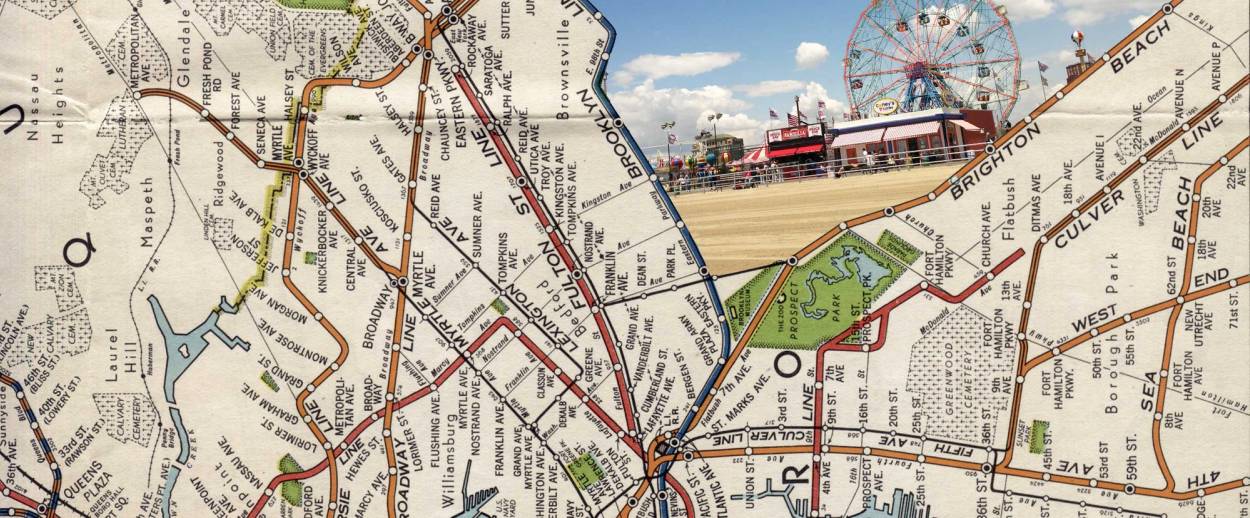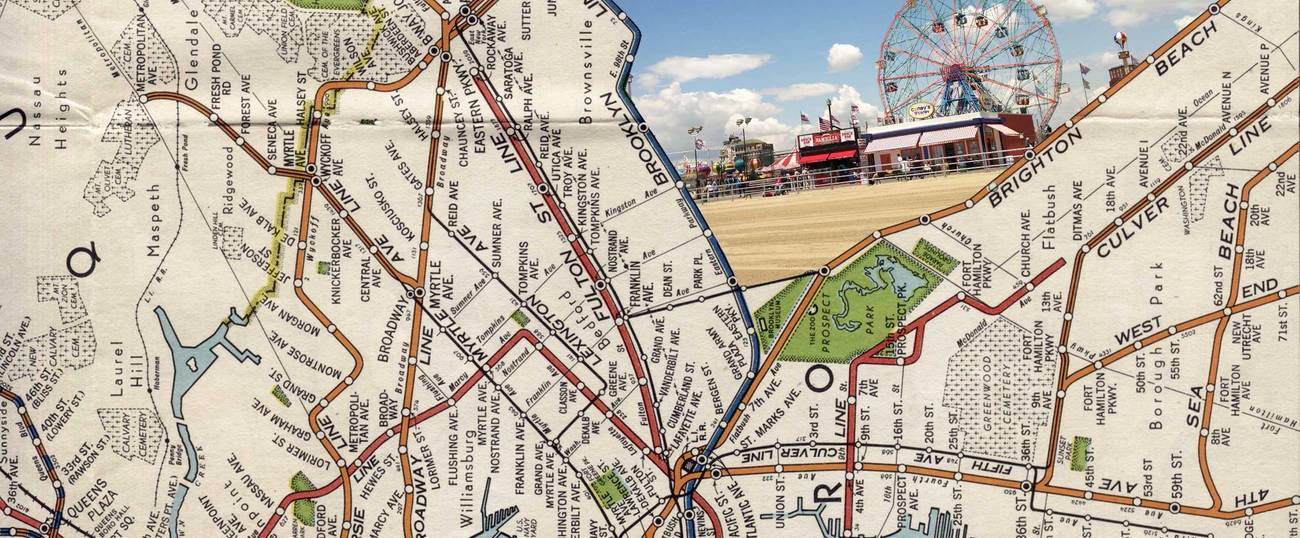Summer in the Golden City
Rokhl’s Golden City: Get out while you still can. Hit the Yiddish hills, escape into ’80s TV (when Russians were Russians and women wrestled), or just flee to Canada.




Summer in the Golden City. A fragrant three-to-four-month stretch more golden shower (Thanks, Donald) than golden season; something to be endured with the promise of a crisp fall arriving at some point. Maybe.
When it comes to Yiddish life in the summer, the secret is: Everyone who can leaves, especially my friends, it seems. My great pals Shane Baker and Miryem-Khaye Seigel (gamine of the Yiddish stage), are leaving in a few days for a tour of Sweden. Anthony Russell, the gay black Yiddish singing operatic bass (the original quadruple threat), has been making me green with envy, posting pictures of his fabulous Helix Project trip to Eastern Europe. If you aren’t on tour or on reverse Birthright you may be attending one of the many international Yiddish language summer programs or performing at one of the star-studded Jewish festivals in places like Weimar and Krakow.
Back in the day, the women and children of New York City escaped to the Catskills during the week and waited for the men to join them on the weekend. If you’ve seen Dirty Dancing you have a pretty good idea of what the tail end of the Catskills golden era looked like. Summer hijinks in the Catskills was the subject of many Yiddish-English comedy songs.
Now anyone with at least five vacation days banked can get that taste of lakeside gan eydn. There’s still time to sign up for the Workmen’s Circle Trip to Yiddishland or for KlezKanada. For the confident Yiddish speaker (or student) Yiddish Vokh is a total immersion experience in an idyllic setting.
No one really wants to be in New York in the summer, except the people who do. I certainly don’t. Benny Bell sums up my feelings about being stuck in the city. But unlike so many of my artist and musician friends, I have an office job whose one season is ceaseless toil. Well, not entirely. There is a sort of summer, even in my climate-controlled world. Its kickoff is marked by a flurry of emails, subject line “Please welcome our summer interns…”
The YIVO summer students are sort of like the Yiddish-world interns. It’s true, like interns everywhere, they come with cool events you can crash and the likelihood of free food. On the downside, like interns everywhere, their fresh faces and big dreams remind you of your own failures as well as the possibility that in a couple years, one of those pishers may be your boss. So, you know, be nice.
There’s one non-YIVO summer visitor in town this year—my friend Daniel Kahn is visiting from Berlin, playing a lead role in the Folksbiene’s Amerike: The Golden Land. After seeing the show recently, Dan, Jordan Hirsch (pit trumpet extraordinaire), Shane and I drove from the Battery up to Second Avenue, ancestral pipik of New York Yiddish theatre. The goal was to pay homage and get borscht. We did both. When you get to be my age, closing B&H Dairy after a night of Yiddish theater is the closest you get to hard partying. (I almost didn’t get the challah. Get the challah.)
And if you go to B&H, afterward you can go next door to the Gem Spa, which, according to Shane, is where Boris Thomashefsky created the egg cream. (You can take that story with a grain of kosher salt.) Across from B&H and a few blocks up is the intact (for now) Yiddish Theater Walk of Fame in front of a Chase bank.
Staying out late, eating late; now is when you can say yes to the things that otherwise seem like a bad idea during the winter. It’s too bad that if you go by the Jewish calendar, summer is less about staying up late on sultry nights and more about increasing levels of mourning.
Traditionally, summer is when the Jewish life cycle is at greatest contrast with the non-Jewish. Purim and St. Patrick’s Day sing a drunken harmony. Nowadays Easter and Passover have arrived at an uneasy truce. Khanike and Christmas play very nicely together as long as you don’t look too hard. But laid back, joyful goyish summer and the three-week, nine-day, 25-hour fast of Tisha B’Av? Not so much.
Since the late 1950s, the Congress for Jewish Culture has hosted an event in honor of what is known as the Night of the Murdered Poets. This was traditionally on (or close to) Aug. 12, the date 13 members of the Jewish anti-Fascist Committee were executed in Lubyanka Prison in 1952. (This year the Aug. 12 event was actually held earlier to allow YIVO students to take part.)
The event is solemn, as befits the theme, and serves as a sort of secular Tisha B’Av. No refreshments are served, no fundraising or selling of any kind takes place. Yiddish poetry is at the center of the memorial.
A few years ago Australian artist Jack Feldstein created a gorgeous animation for a poem by murdered poet Peretz Markish:
By the time you read this Tisha B’Av will be over and no matter where you are you can get back to the best part of summer: binge-watching cotton-candy TV.
This summer I’m all about GLOW, the new Netflix show about women’s wrestling. GLOW is set in the ’80s and (to be accurate to the ’80s zeitgeist) includes Russian-American culture clash. In the real ’80s, TV and movies was full of Russians, our favorite other, the ultimate heel, as they say on GLOW.
But those Russians were always written from the outside in. In the fake ’80s of GLOW, the Russian immigrants in Van Nuys get to speak for themselves, specifically through the character of Gregory, the GLOW motel manager. No spoiler, but there’s an adult Russian Jewish circumcision subplot that’s probably my favorite thing about summer TV so far. And not just because it involves an impromptu Yentl tribute.
***
Go: There’s still time to sign up for A Trip to Yiddishland, Yiddish Vokh, or KlezKanada.
Watch: The National Theater’s live production of Angels in America is coming to movie theaters, probably the most crucial ’80s-inspired must-see of the summer, Thursday, Aug. 17, through Sunday, Aug. 20, at IFC Center.
ALSO: I’d rather be in Europe right now. In London, my dear friend, fiddler and master klezmer teacher Ilana Cravitz runs a regular klezmer jam session. The next one is coming up on Aug. 6 at a pub called The Harrison, 28 Harrison Street, WC1H 8JF. Aug. 6 is also when Klezfest London starts, and Ilana will be teaching there, too, along with many klezmer-world luminaries. A couple years ago I bought one of Anya Roz’s magnificently gruesome Judith and Holofernes portraits. I’ve been a fan ever since. This month Anya and her mother, sculptor Julia Segal, have a show in Berlin, Aug. 1-15, at Galerie Vinogradov.
Rokhl Kafrissen is a New York-based cultural critic and playwright.